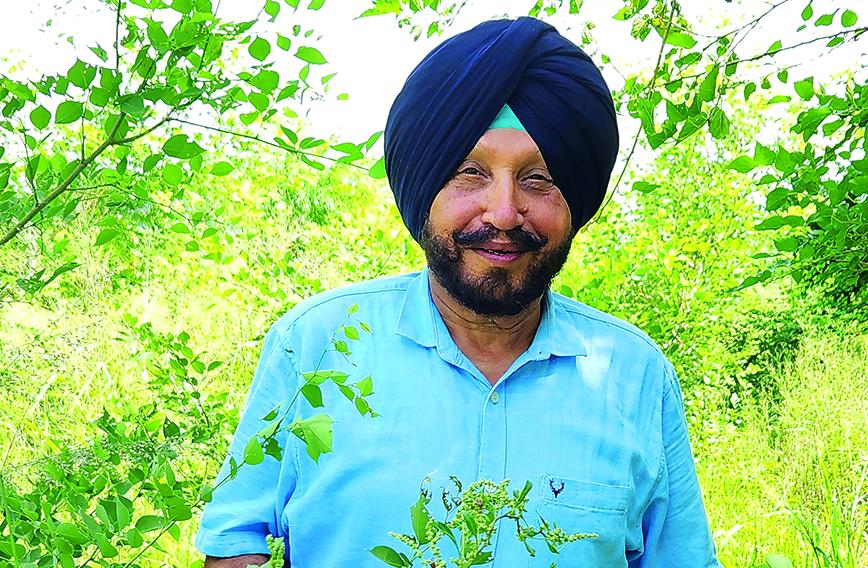
Col Gill: As the trees grow, Punjab will have a new forest
Col Gill brings back a forest to save a river in Ludhiana
Umesh Anand
TREES disappear in twos and threes. Entire forests vanish. Public land gets encroached on. Human wastes and chemicals get dumped in water bodies.
What can you do about such ugly transgressions even as they sully your life? Precious little, you might say. Cleaning up after others isn’t easy. There is no joy in getting cumbersome governments to act. Holding offenders to account can get messy.
Move on and let it happen would be the cautious response. But not so with Lt Col Jasjit Singh Gill, 67, who is retired from the Army, has farming interests and lives in Ludhiana, Punjab’s overgrown and underserved commercial hub.
He has through doughty efforts for the past three years been successful in getting the government to begin regreening both banks of the Buddha Dariya, which is infamous as Punjab’s most polluted river.
At his urging 18 acres have been reclaimed from encroachers downstream and 7,000 trees have been planted. Another 24 acres have been reclaimed upstream. The reclaimed banks have been fenced.
If Col Gill’s efforts are carried through, as many as 300 acres could be regreened over time. The trees that have been planted are young. But as they grow, they are well on their way to being the ‘newest forest in Punjab’, as Col Gill excitedly puts it. The planting of the trees, all local species, has been done by the forest department.
The Buddha Dariya flows through Ludhiana and then joins the Sutlej. The busy and teeming city dumps all its wastes into the Buddha Dariya, reducing its status from a small river to the equivalent of a drain. Sewage, dairy wastes and dung, chemicals from dyeing units and whatnot go into its waters.
Treatment of noxious effluents takes place mostly in name. A grandiose project by the previous Congress government has involved huge sums of public money but with poor detailing it has been a non-starter.
A small band of citizens, of which Col Gill is a part, have been trying to get dairies to shift and mills and dyeing units to be more responsible but, as expected, entrenched interests have been unmoved.
The Buddha Dariya carries its pollution downstream and poisons the water that people downstream need for agriculture and personal consumption. On the journey down, its banks have been grabbed, mostly by farmers extending their reach and thereby weakening the capacity of the river to regenerate itself through environmentally friendly trees and grasses. In addition, dredging of the river by the government results in plastics and wastes being fished out and dumped along its course.
Realizing that changing the situation within Ludhiana’s municipal limits was full of its own challenges, Col Gill began exploring opportunities for freeing up the banks of the river outside municipal limits and greening them — turning them into ‘forests’, if you wish.
Clearly this was a big project which he couldn’t possibly do in his own capacity or by involving well-meaning citizens. It needed the government to act. Land had to be taken back from encroachers and the planting of trees on a large scale involves not just costs but also manpower and expertise.
Col Gill was a member of the State Taskforce on the Buddha Dariya Rejuvenation. At a virtual meeting, being during the pandemic, in 2021 he suggested the planting of trees and vetiver grass on 34 km on both sides of the river outside municipal limits. This together came to 68 km. The idea was that the greenery would stabilize the banks which were eroding during the rains.
It would also be compensation for the trees that had been cut down for the widening of the national highways linking Ludhiana with Ferozepur and Chandigarh as well as a bypass.
Col Gill also suggested the demarcation of what was Buddha Dariya land using GPS and 2015 records. This was needed because the basin of the river had been steadily shrinking.
Both proposals went through. But implementation was still a long way off. A Rs 2.46 crore contract was awarded for planting 17,000 trees, but it fizzled out. Demarcation of the river and getting encroachers to withdraw was caught up in wrangles in the government, as one could well imagine.
Col Gill persisted. Finally, the planting of trees was handed over to the forest department instead of the drainage department, as it rightly should have been in the first place. The demarcation work and removal of encroachers got its real boost when a new deputy commissioner, Surbi Malik, took over. She too took ownership of the proposal and drove it as only a determined local official can.
The whole process of demarcating the Buddha Dariya’s boundaries to get rid of encroachers and the going back to revenue records has many spinoffs. For instance, upstream there is a possibility of getting some 200 cusecs of clean water which can significantly dilute the pollution in the river. Similarly downstream, a branch of the river has 32 km which can be freed up from encroachers for regreening.
What drives efforts like Col Gill’s is difficult to tell. But they provide optimism that it is possible to get out of a difficult hole. A cause well pursued can have effect.
Comments
-

Rajinder Singh Kalra - Jan. 21, 2024, 8:21 p.m.
A wonderful job done by Col Gill. I am ready to coopperate with him in his future plans to save Budha Dariya. A big salute to the brave Colonel.
-

Baljit Singh - Oct. 23, 2023, 11:08 a.m.
Amazing work Col Gill. You are a role model for the country. We need to highlight your amazing work. Baljit Singh Founding Member Guru Nanak Dev Global University of Dallas CEO Ajuba
-

Mridula Jain - Oct. 4, 2023, 3:47 p.m.
Wonderful efforts with selfless service




